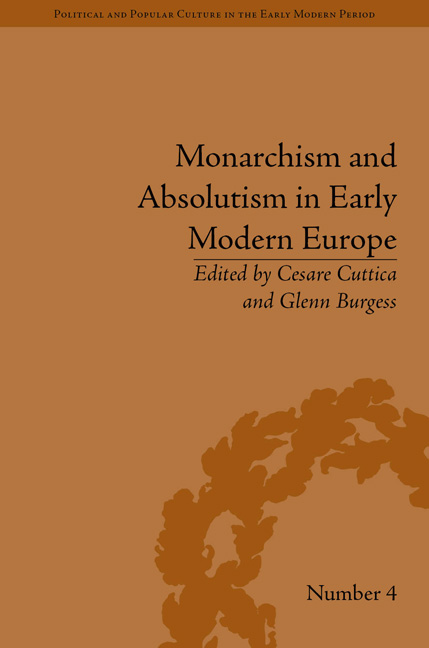Book contents
- Frontmatter
- CONTENTS
- Acknowledgements
- List of Contributors
- Introduction: Monarchism and Absolutism in Early Modern Europe
- Part I Royalists, Republicans, Patriarchalists: English Thinkers at Odds in the Seventeenth Century
- Part II Absolutism, Cynicism, Patriotism: Eighteenth-Century Enlightenment Reflections
- 4 Cynic Kingship in the German Enlightenment
- 5 Polizey and Patriotism: Joseph Von Sonnenfels and the Legitimacy of Enlightened Monarchy in the Gaze of Eighteenth-Century State Sciences
- 6 Absolutism, Patriotism and Publicity in Denmark-Norway in the Eighteenth Century: Jens Schielderup Sneedorff, Andreas Schytte and Frederik Sneedorff
- 7 Jansenist Jurisdictionalism and Enlightenment: Two Ways of Thinking Politics in Mid-Eighteenth-Century Naples
- Part III Absolutism, Monarchism, Despotism in Theory and Practice: Contested Historiography and Comparative Approach
- Part IV Monarchy, the State of Nature, Religion and Iconography in European Perspective
- Notes
- Works Cited
- Index
6 - Absolutism, Patriotism and Publicity in Denmark-Norway in the Eighteenth Century: Jens Schielderup Sneedorff, Andreas Schytte and Frederik Sneedorff
from Part II - Absolutism, Cynicism, Patriotism: Eighteenth-Century Enlightenment Reflections
- Frontmatter
- CONTENTS
- Acknowledgements
- List of Contributors
- Introduction: Monarchism and Absolutism in Early Modern Europe
- Part I Royalists, Republicans, Patriarchalists: English Thinkers at Odds in the Seventeenth Century
- Part II Absolutism, Cynicism, Patriotism: Eighteenth-Century Enlightenment Reflections
- 4 Cynic Kingship in the German Enlightenment
- 5 Polizey and Patriotism: Joseph Von Sonnenfels and the Legitimacy of Enlightened Monarchy in the Gaze of Eighteenth-Century State Sciences
- 6 Absolutism, Patriotism and Publicity in Denmark-Norway in the Eighteenth Century: Jens Schielderup Sneedorff, Andreas Schytte and Frederik Sneedorff
- 7 Jansenist Jurisdictionalism and Enlightenment: Two Ways of Thinking Politics in Mid-Eighteenth-Century Naples
- Part III Absolutism, Monarchism, Despotism in Theory and Practice: Contested Historiography and Comparative Approach
- Part IV Monarchy, the State of Nature, Religion and Iconography in European Perspective
- Notes
- Works Cited
- Index
Summary
An appeal to all patriots in Denmark-Norway for the publication of economic proposals aiming at improvement and a call for treatises to be written on all sorts of topics pertaining to the common good was issued from the government on the King's birthday in 1755. The treatises should be transmitted to the Prime Minister, and they would be printed without regard to personal standing and without cost to the author. A limited public debate was launched by the government, which financed their publication. Publicity and public debate were obviously regarded as important by the government. Patriotism and publicity should legitimatize the politics of absolutism.
It seems likely that the appeal of 1755 was in fact the reason for the growth in public debate. At no time prior to the liberation of the press in 1770 was such a quantity of literature published as in 1756, 1757 and 1758. The responses to the general call for tracts on improvement were published in the journal Economic Magazine for Denmark and Norway, which began publication late in 1757. It was edited by Erik Pontoppidan, and eight large volumes were issued before his death in 1764. Erik Pontoppidan was professor of theology and vice-chancellor of the University of Copenhagen. He combined a type of pietism inspired from Halle with enlightenment ideas, merging thus pietism, patriotism and political economy.
- Type
- Chapter
- Information
- Monarchism and Absolutism in Early Modern Europe , pp. 91 - 100Publisher: Pickering & ChattoFirst published in: 2014



